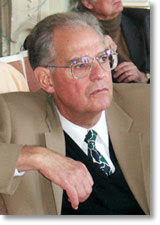 I was going to post an original today, but it has evaded me... So here is a wonderful quote from Oswald Bayer. It reflects many of the things I have written concerning the structure of our lives being communicative in nature. I express this explicitly in my post, The Word, Communication, and Sanctification.
I was going to post an original today, but it has evaded me... So here is a wonderful quote from Oswald Bayer. It reflects many of the things I have written concerning the structure of our lives being communicative in nature. I express this explicitly in my post, The Word, Communication, and Sanctification.Bayer says that the church (in its broadest sense) is the primary order of creation where we are addressed by God's Word and where we are expected to respond to that Word in faith. Life takes on a liturgical shape that is reflected in our own divine service.
"According to the second narrative of creation, God's first word to humankind is the promise of life (Gen. 2:16): "You may eat..."! This promise of life, however, is guarded by a threat of death (Gen. 2:17): "But of the tree of the knowledge of good and evil you shall not eat, for in the day that you eat of it you shall die.
"In his Lectures on Genesis (1535), Luther comments on this passage in lapidary fashion: "Here we have the establishment of the church before there was any economic or political order." Prior to household and government, God instituted the church, not a particular church but a universal church, a church without walls. It existed in the word and in faith, by the fact that God calls Adam (and so all humankind), into life, and in this way "preaches" to him, "sets his word before him." Accordingly, "God wants only this: that he [Adam] praises God, that he thanks him, and that he rejoices in the Lord."
"There are three basic forms of life, three orders (stande). Although they are interconnected, they also need to be distinguished. God the creator has established these orders and he orders human life in them by his word. Of these three basic forms of life: the church, the household (including marriage and family), and the state, the church is the first. It is the basic order. It includes all people, since all are addressed by God and are called to offer him a free and thankful response. We are humans precisely because God has given us life, because he has addressed us, because we can hear him, and because we can and must respond to him. God's address and our human response are the essence of worship. Indeed, they are the essence of religion, cult, and church, if we understand church here as an order of creation. All people and all religions belong to it. Every human being as such belongs to the church, as an order of creation. In fact, this is what defines us as humans. But this order is now corrupt due to human ingratitude and sin, so that it is no longer in fact the church.
"Luther holds that divine service, the church, is meant to be an "order of creation," and not, in the first place, something specifically Christian. That may at first strike us as a strange thesis! But its value will become evident as we proceed.
"The scriptures provide us with the basis for a particular kind of "natural" theology and at the same time a phenomenology of religion. We find it in the primordial promise of life, valid for all people (Gen 2:16), as well as in God's self-introduction, "I an the Lord, your God!" (Exod. 20:2). We also find it in the first commandment, that we should have no gods besides him (Exod. 20:3), where the threat of death guards the promise of life (Gen 2:17). Like Romans 1:18-3:20, natural theology assumes that every human being lives in a relationship with God, which, in practice, is always being broken from our side, and so is fundamentally disordered. Reason, not so much theoretical but practical reason, guided by the imagination, always tries to grasp hold of God, but it is always wide of the mark. Luther (commenting on Jonah 1:5: "The sailors were afraid and each cried to his god") could say quite emphatically: "these men in the ship all know of God" "but they have no sure God." The office of Christ is to make us certain of God."
-Oswald Bayer, Theology the Lutheran Way, trans. Jeffrey Silcock and Mark Mattes (Grand Rapids, MI: Wm. B. Eerdmans Publishing, 2007), 86-87.




No comments:
Post a Comment